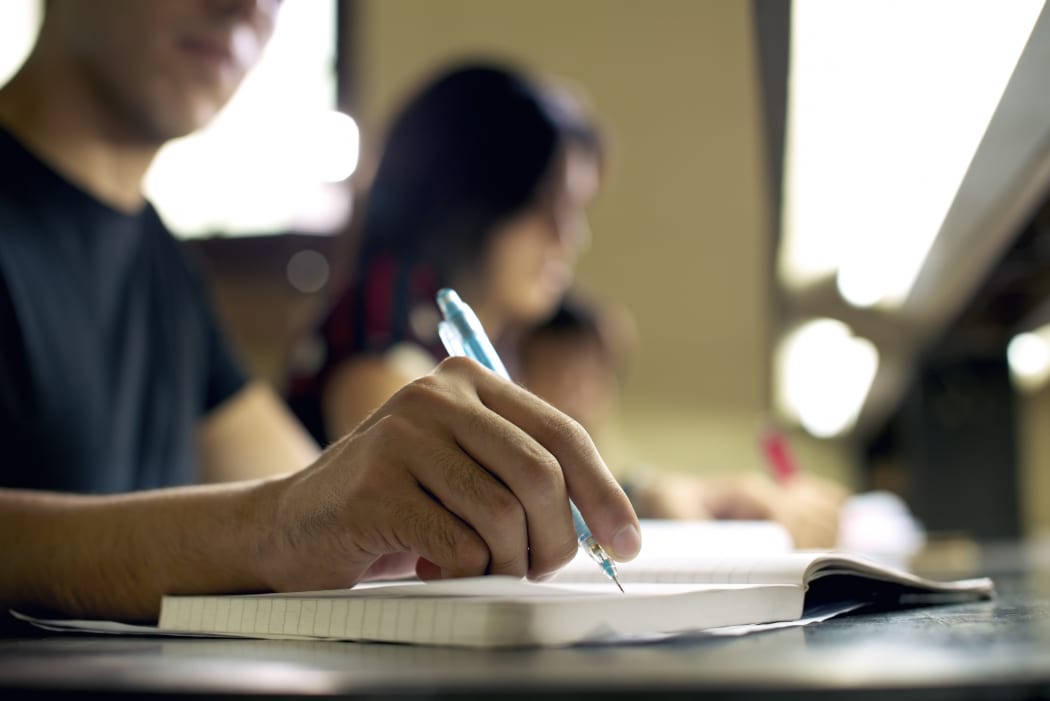The government has been told NCEA's literacy and numeracy requirements should be changed or replaced altogether with a separate test.

New research shows many young people who achieve NCEA Level 2 are very poor at reading, writing and maths. Photo: 123RF
Official documents show the Education Ministry gave that advice last year after research showed many teens getting the NCEA were not functionally literate or numerate.
Now the Ministry has called in school principals, teachers and business groups to discuss where the benchmark for literacy and numeracy should be set.
Teenagers have to get at least 10 Level 1 credits from literacy-rich subjects, and 10 from those rich in maths in order to get level 2 of the NCEA.
But research carried out by Maths Technology for the Tertiary Education Commission indicates many young people meeting that requirement are very poor at reading, writing and maths.
The study, reported on by RNZ in March 2016, said the NCEA requirements were not a reliable indicator of literacy and numeracy ability and might need to be replaced by a new test.
It said 40 percent of Year 12 students who had met the NCEA requirements were not at the level of literacy and numeracy regarded by the OECD as the minimum for life in a knowledge economy.
The study said individuals might be misled into believing that they were functionally literate and numerate when they were not, and policy makers might overestimate the literacy and numeracy competencies of school leavers.
In the wake of that research, documents provided under the Official Information Act show the Education Ministry told the government in May 2015 that a new test might be needed.
"We expect that either adjustment will be required to what achievement standards are assessing through our review and maintenance of NCEA, and/or to the existing unit standards, or a separate literacy and numeracy assessment developed."
The documents show some agreement among the ministry's Assessment Overview Group - experts that advise the ministry and Qualifications Authority - that the NCEA had too little focus on literacy and numeracy.
But the group opposed the creation of a new assessment, saying it would be better to try to spot those unlikely to meet the desired standards when they were in Years 8 and 9.
In December 2015, the Ministry advised that evidence suggested there needed to be a robust benchmark for literacy and numeracy along with a reliable assessment for testing if teens had reached it.
This week it told RNZ that it was working on where to set the benchmark.
"We're talking to employers, principals, education unions, and tertiary providers to seek their views as part of this work. We expect a decision over the next few months on next steps."
Industry Training Federation chief executive Josh Williams said there were too many different measures of literacy and numeracy across schools and tertiary institutions and they needed to be harmonised.
He said there was already a test that schools could use to replace the NCEA requirements.
"The literacy and numeracy test that is used in the tertiary system for foundation learners, that's benchmarked against OECD benchmarks of functional literacy. There is a youth version of that test that is used in quite a widespread way in schools and it is something the government has invested quite a lot in."
Mr Williams said the test could be reported alongside school-leavers' NCEA results.

PPTA President Angela Roberts Photo: PPTA
But Post Primary Teachers Association president Angela Roberts said there was no need for the test.
"Adding another form of assessment is not necessary. The data is there, we just have to be really clear about which bits of NCEA are the good measures."
Ms Roberts said the Qualifications Authority and Education Ministry needed to decide which of the existing NCEA standards were best for assessing students' literacy and numeracy.
"That's worth exploring - making sure that the evidence we're picking up out of kids' NCEA is the right evidence at the right level so we're confident they're literate and numerate to go off into the big wide world."
Secondary Principals Association president Sandy Pasley said any change to the standards expected of students would need to be introduced before students reach Year 11 and begin working on the NCEA.

Secondary Principals Association of New Zealand Sandy Pasley Photo: Secondary Principals Association of New Zealand
"What needs to happen if there was changes [is] that they be signalled and really introduced into schools' curriculum in Years 9 and 10 to make sure students are well prepared."
The OECD says the minimum level of literacy and numeracy required for life in a modern society is roughly the level required to complete secondary schooling.
It ensures people can integrate several sources of information and solve reasonably complex problems.
People below that level will have trouble learning new job skills, and need information that is simple and easy to follow.




